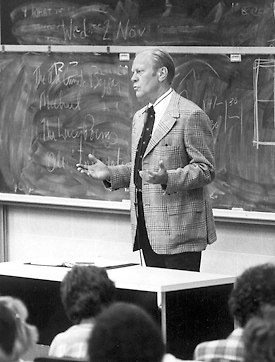As it celebrates its centennial, the Department of Political Science will place greater emphasis on improving the undergraduate experience through new research opportunities, internships and access to outstanding faculty, the department chair says.
The department long has been recognized as one of the nation’s best for its curriculum and faculty for 100 years. Currently more than 950 concentrators (897 majors and 54 minors) are seeking a political science degree, making it one of the largest majors on campus.

Over the years the Department of Political Science has brought in notable lecturers, including former President Gerald R. Ford. File photo, Paul Jaronski, U-M Photo Services.
“Students recognize that the concentration lives up to its aim of educating them for active citizenship by making them astute observers of both their own government and political systems around the world,” says Charles Shipan, chair of the department.
Shipan and other faculty note that political science graduates have had distinguished careers in many fields worldwide, not exclusively to related to politics or the law. Some have gone into academics, business and finance. Others had more distinctive careers as professional athletes, movie stars and filmmakers.
Colin Gray, a 1990 U-M graduate, says the lessons learned from his political science courses are applicable in his work today as a documentary filmmaker.
“The hallmark of political science is to seek multiple perspectives and to research a subject deeply to understand underlying causes. Ironically, documentary filmmakers have a very similar approach. We research a subject extensively and then try to weave together multiple perspectives to form a compelling a story,” says Gray, a keynote speaker during the department’s 100-year celebration this month.
The department formally was established in 1910, but political science courses have been taught at U-M since 1860.
Course programs during its early years focused on training and research in governmental policy-making and administration, more recently the department has emphasized political behavior and the formal study of institutions.
One impact on the curriculum and approach to political science began in 1946 with its linkages to the Institute for Social Research. Two years later, the American National Election Study enabled the university to become a political resource for researchers and graduate student training. ANES is the oldest, continuous series of survey data investigating electoral behavior and attitudes in the world.
Upcoming events
Alumni, students and faculty are invited to a series of events in October and April 2011 to commemorate the Department of Political Science’s first 100 years. All events are free and open to the public.
• Thursday, a film screening of “Freedom’s Fury” begins at 7:30 p.m. in the Michigan Theater, 603 E. Liberty. Colin Gray, a 1990 U-M graduate and documentary filmmaker, wrote and directed this movie about the 1956 water polo match between Hungary and the former Soviet Union that took place while Soviet tanks were suppressing a popular uprising in the Hungarian capital, Budapest.
• Friday, an 11 a.m. keynote address by Gray and three panel presentations will occur in the Michigan Union Ballroom. The panels — which will address world affairs; state politics; and mass communication, fundraising, campaigning and public service — are scheduled at 1:30 p.m., 2:45 p.m. and 4 p.m., respectively. Among those participating — all former undergraduate majors in political science — are Lt.Gov. John D. Cherry; former Ambassador Melvyn Levitsky; former state senator Lana Pollack; newly elected UAW president Bob King; and Judge Kurtis Wilder.
• Friday, 5-7 p.m., an open house in the department’s fifth floor Haven Hall offices.
• April 6, 2011, the department will host a three-day series of roundtables and panels, targeted primarily at past and present graduate students and faculty.
For additional information about the centennial events, go to polisci.lsa.umich.edu/centennial/index.html#screening or call 734-763-1348.
“It means that we have an impact through our teachings that affect the world,” says Nancy Burns, director of the Center for Political Studies.
During the last 50 years, the department has hired exceptional professors involved in cutting-edge research. These professors and visiting scholars — including former President Gerald R. Ford, who served as an adjunct professor and conducted lectures and seminars in the late 1970s — enhanced the teaching environment.
A world-renowned faculty, as well as strong curriculum, has led to numerous honors and awards. U.S News & World Report rated U-M as having one of the top political science programs in the country. High-quality education for undergraduates is just as critical. Students choose a degree in political science because they recognize the importance of preparing for active citizenship; the concentration enables them to become astute observers of both their own government and political systems around the world. The department currently has more than 900 concentrators, making it one of the largest majors on campus.
Even with the accolades, Shipan says the department continually has sought ways to improve the undergraduate experience. For example, the honors program — which began in 1950 — recently has implemented several changes to both increase the number of students it serves and to improve the experience for those students. In particular, the program now teaches potential honors students about the craft of research prior to their acceptance into the program.
“By introducing potential honors thesis writers to political science research techniques before they apply and are admitted into the honors program, we will improve the experience for our students,” Shipan says.
Improving research opportunities also meant greater faculty participation in the Undergraduate Research Opportunity Program, which creates partnerships between first- and second-year students and U-M faculty.
Another major development in recent years has involved internship programs, including the Michigan in Washington program that offers 40 students an opportunity to spend a semester in the nation’s capital. Now in its fifth year and open to students in all majors, students view first-hand how Washington works by attending congressional hearings, conducting research and program evaluations, and meeting with top officials.

